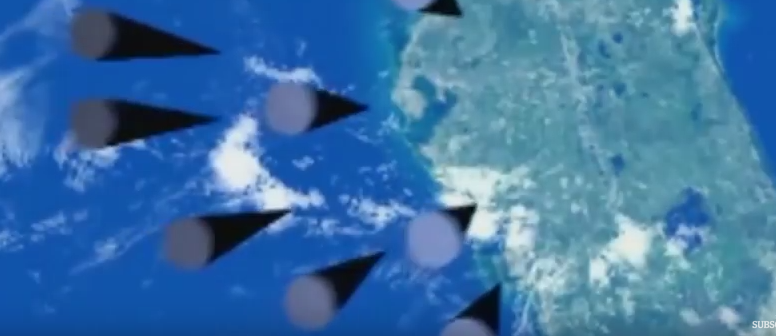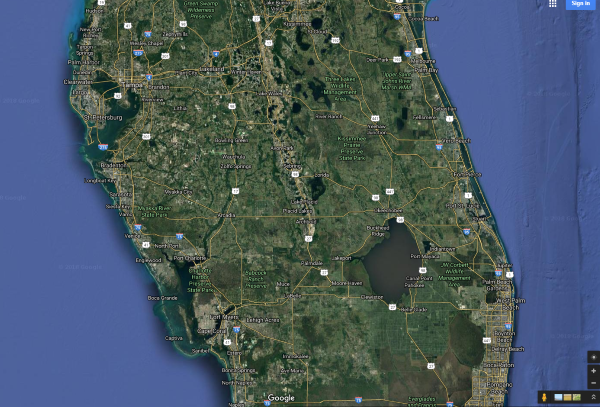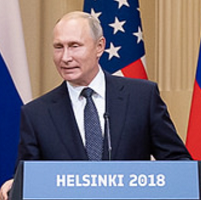Russian President Vladimir Putin made several false and misleading claims during his press conference in Finland with President Donald Trump and in an interview with Fox News.
- Putin falsely claimed that business associates of William Browder, who had lobbied for a 2012 U.S. law sanctioning Russians, had given $400 million to Hillary Clinton’s presidential campaign. Those affiliated with the firm in question gave just $17,700 to Clinton.
- Discussing the case of a Russian firm indicted for meddling in the 2016 U.S. election, Putin said, “So far, American court has not discovered any trace of interference whatsoever.” That’s misleading. There’s an ongoing legal dispute over pretrial evidence. There is, however, plenty of evidence in the indictments.
- Putin denied that a video played during his annual state of the nation address showed an animated depiction of nuclear warheads raining down on Florida — not far from Trump’s Mar-a-Lago private resort and golf club. But it did.
Putin spoke after he and Trump held a summit in Helsinki, Finland, on July 16.
We don’t typically fact-check foreign leaders, but in this case, Putin’s comments were part of a high-profile event with the U.S. president. And besides, there are no fact-checking organizations in Russia, according to the Duke Reporters’ Lab.
Clinton Campaign Contributions
In the July 16 joint press conference, Putin claimed that business associates of William Browder evaded taxes in Russia and gave “a huge amount of money — 400 million — as a contribution to the campaign of Hillary Clinton.” There’s no evidence of such large contributions to Clinton’s campaign.
Browder is no longer a U.S. citizen. Those affiliated with a U.S. investment firm the Russian government has linked to Browder gave just $17,700 to Clinton’s campaign in 2016, according to the Center for Responsive Politics, and a total of $1.76 million to candidates, committees and outside groups in the 2016 election cycle.
While $1.1 million went to Democratic candidates and committees, another $205,600 was given to Republicans.
Clinton raised a total of $563.8 million, and outside groups supporting her campaign raised another $231 million.
Putin, July 16: Business associates of Mr. Browder have earned over one and a half billion dollars in Russia. They never paid any taxes, neither in Russia nor in the United States and yet the money escaped the country, they were transferred to the United States.
They sent a huge amount of money – 400 million – as a contribution to the campaign of Hillary Clinton. Well, that’s their personal case, it might have been legal, the contribution itself, but the way the money was earned was illegal.
Putin made an offer that special counsel Robert S. Mueller could come to Russia to observe questioning of the 12 Russian military intelligence agents indicted on July 13 for hacking into Democratic Party and Clinton campaign computer networks — but in exchange Putin wanted Russian law enforcement to be able to sit in on interviews with “officers of law enforcement and intelligence services of the United States, whom we believe have something to do with illegal actions on the territory of Russia.” He then mentioned Browder.
Browder, founder and CEO of investment firm Hermitage Capital Management, was born in the United States but renounced his citizenship in 1998. He helped get Congress to pass the 2012 Magnitsky Act, which banned some Russians from entering the United States and froze their assets held in U.S. banks. The act is named for Sergei Magnitsky, a Russian lawyer who worked for Browder and exposed a tax fraud scheme linked to the Kremlin. He was arrested in Russia and died mysteriously in jail in 2009.
In retaliation for the Magnitsky Act, Russia prohibited U.S. citizens from adopting Russian children.
Browder told CNBC on July 16 that Putin’s allegations about funneling money to the Clinton campaign were false. “I did not,” he said. “I’m not a U.S. citizen. I don’t live in the United States. I’ve been living in Britain for 29 years. I make no campaign contributions, and so that’s not true.” (Browder also wrote in Time magazine about Putin’s claim and Browder’s history with the Russian government.)
This charge against Browder also came up in the June 2016 meeting in Trump Tower between Donald Trump Jr., other Trump campaign officials and Russian lawyer Natalia Veselnitskaya. Donald Trump Jr. agreed to the meeting after he had been promised incriminating information on Hillary Clinton. Veselnitskaya told the Wall Street Journal in July 2017 that she wanted to give the Trump campaign information about Browder. The Journal reported that “she said she wanted to inform the Trump campaign of allegations that an American firm Mr. Browder worked with, Ziff Brothers Investments, had dodged taxes in Russia and later donated to Democrats.”
Veselnitskaya’s talking points for that meeting, obtained and published by the New York Times in 2017, claim the Ziff Brothers “took part in financing both Obama” campaigns and that “[i]t cannot be ruled out that they took part in financing the campaign of Hillary Clinton.”
Those affiliated with the Ziff Brothers gave $17,700 to the Clinton campaign. And donations to other Democratic committees — $1.1 million — don’t come anywhere close to Putin’s $400-million accusation. For the record, affiliates of Ziff Brothers gave $22,362 to President Obama’s reelection campaign in 2012, and $20,750 to Republican Mitt Romney’s campaign.
The U.S. Case Against ‘Putin’s Chef’
In an interview with Fox News’ Chris Wallace, which took place shortly after the summit between Putin and Trump, Putin pushed back at the U.S. intelligence community’s finding that Russia interfered with the 2016 election to help Trump.
First, Putin made the curious defense that “every single grain” of information contained in the pilfered emails was “true and the Democratic leadership admitted it.” Second, he said there is no trace of interference — at least as it involves a company controlled by one of his close associates, Russian oligarch Yevgeniy Prigozhin, a man described as “Putin’s cook” or “Putin’s chef.”
Putin, July 16: And now for the specific accusations. First of all, special counsel Mueller has accused a certain private company in Russia that is not even a very big enterprise. The core area of competence is a restaurant. And now this company hired American lawyers and defending its integrity and reputation in American court. So far, American court has not discovered any trace of interference whatsoever. Do you know it or not? Millions of Americans know about it.
That’s misleading.
The “certain private company in Russia” referenced by Putin is Concord Catering. Prigozhin and his two companies, Concord Management and Consulting LLC and Concord Catering, were indicted by special counsel Mueller on Feb. 16. In all, the indictment included charges against three Russian organizations and 13 Russian nationals, which resulted in U.S. sanctions against all defendants, including Prigozhin and his companies.
The special counsel’s office alleges that Concord financed an extensive social media campaign designed to help Trump win the presidential election. Concord entered a not guilty plea on May 9.
Putin says the “American court has not discovered any trace of interference whatsoever” on Concord, but the case hasn’t progressed very far. It has yet to even get to the discovery phase, which has resulted in a flurry of charges and counter-charges between the government and Concord’s lawyers.
At a court hearing on May 16, Eric Dubelier, one of Concord’s American attorneys, complained that the government refused to turn over pretrial evidence that it has amassed on his client. In a court filing on June 29, Mueller’s office said the attorneys for Prigozhin and his companies should not get access to pretrial evidence unless the Russian businessman comes to court.
On July 16 — the same day as Putin’s press conference with Trump and his interview with Wallace — Prigozhin’s lawyers asked the court to dismiss the charges, claiming that a conspiracy did not exist and the underlying law used by the U.S. government to bring charges was “unconstitutionally vague.”
At this point, no evidence has been brought to trial — as both sides wrangle over discovery materials — so to declare that the U.S. court “has not discovered any trace of interference whatsoever” on Concord is misleading. There is, however, plenty of evidence in the indictment.
The special counsel’s office alleges that the Internet Research Agency, a Russian-based online propaganda company, oversaw the pro-Trump social media campaign, and Concord “spent significant funds” to finance the organization’s pro-Trump activities.
The Internet Research Agency, described in the indictment as the “organization,” began in April 2016 to “produce, purchase, and post advertisements on U.S. social media and other online sites expressly advocating for the election of then-candidate Trump or expressly opposing Clinton.” In June 2016, it began to stage political rallies. For example, the defendants paid “one U.S. person to build a cage on a flatbed truck and another U.S. person to wear a costume portraying Clinton in a prison uniform” for a “Florida Goes Trump” rally in August, the indictment says.
“Concord controlled funding, recommended personnel, and oversaw [the Internet Research Agency’s] activities through reporting and interaction with [the organization’s] management,” the indictment says. Mikhail Ivanovich Bystrov, the general director and highest-ranking official of the Internet Research Agency, “frequently communicated” with Prigozhin about the social media campaign.
“Prigozhin approved and supported the organization’s operations, and defendants and their co-conspirators were aware of Prigozhin’s role,” the indictment says.
By September 2016, the Internet Research Agency’s monthly budget was more than $1.25 million U.S. dollars. To conceal the payments, Concord paid the Internet Research Agency through 14 bank accounts held in the names of various Concord affiliates.
Putin seems to be following the Concord case closely. He knew the company had hired a U.S. law firm to represent it, and he seemed to be familiar with the dispute between the government and the company over pretrial evidence. But his statement that the court “has not discovered any trace of interference whatsoever” distorts the facts.
Is It Florida?
In his interview with Wallace, Putin also denied that a video played during his annual state of the nation address showed an animated depiction of nuclear warheads raining down on Florida. But it did.
Wallace asked Putin about the video, which highlighted a new generation of Russian missiles that Putin described in March as “invincible” intercontinental cruise missiles capable of evading U.S. missile defenses. Given that the video — unveiled at Putin’s annual state of the nation address at the beginning of March — showed warheads hitting Florida, Wallace asked, “Aren’t you escalating the arms race, and aren’t you being deliberately provocative?”
Putin countered that the footage “did not specify that it — the missile is about to hit the United States.” He said Wallace needed to “look at [the video] more carefully.” Putin went on to say that there was no “caption” on the map indicating that it was Florida, and he scolded Wallace, saying, “don’t try to scare your population with make-believe threats.”
Citing anonymous “sources with direct knowledge,” Axios reported on July 15 that the video enraged Trump, and that Trump later “lashed out at the Russian president in a phone call.” The article notes that “the motion graphic in Putin’s video appeared to show missiles raining down on Florida — the home of Trump’s Mar-a-Lago club.” We would also note that U.S. Central Command, known as CentCom, is headquartered at MacDill Air Force Base in Tampa.
Here’s the full exchange from the Fox News interview:
Wallace: Last year, Defense Secretary Mattis said that Russia is the greatest threat — Russia is the greatest threat to the United States and, he has since made it clear, an even greater threat than terrorism. In March, you introduced a new generation of Russian missiles, including what you called an invincible missile you said — that could evade — defeat all of our missile defenses. And you even released a video that showed this super missile flying over the United States and hitting Florida very near where President Trump’s estate is at Mar-A-Lago. Aren’t you escalating the arms race, and aren’t you being deliberately provocative?
Putin: As far as the footage is concerned, well, they did not specify that it — the missile is about to hit the United States. You have to look at it more carefully. Secondly –
Wallace: It shows Florida —
Putin: It — that was not signed Florida. There was not a caption saying Florida. They could — take a more careful look at it. There was never a caption, “Florida.”
Wallace: No, but you can see it on the map.
Putin: It was flying over the eastern coast of — no, no, no, it couldn’t be seen on the map. Just take a closer look, and don’t, don’t try to scare your population with make-believe threats. And now — I’m pretty sure I can give you as a present this footage.
So was it Florida?
Former CIA and NSA Director Michael Hayden certainly thought so. On the day after Putin’s video was unveiled, Hayden told CNN “one of the stunning aspects of the demonstration” was that Russia “would actually use an absolutely recognizable part of the United States to show where the targeting was.”
Here’s a screenshot from the video:

And here’s a Google image of Florida:

It looks like Florida to us, but just to be sure, we reached out to David Folch, a professor in the Department of Geography at Florida State University. He teaches several courses in Geographic Information Systems and, well, he lives in Florida.
“Definitely Florida,” Folch told us via email. “You can see the shape of the Tampa Bay area, outline of Cape Canaveral, Lake Okeechobee, etc., etc.”
We’ll allow that, as Putin said, there was no caption identifying the land mass in the video as Florida. But it’s Florida.

 FactCheck.org Rating:
FactCheck.org Rating: 
 FactCheck.org Rating:
FactCheck.org Rating:  FactCheck.org Rating:
FactCheck.org Rating: